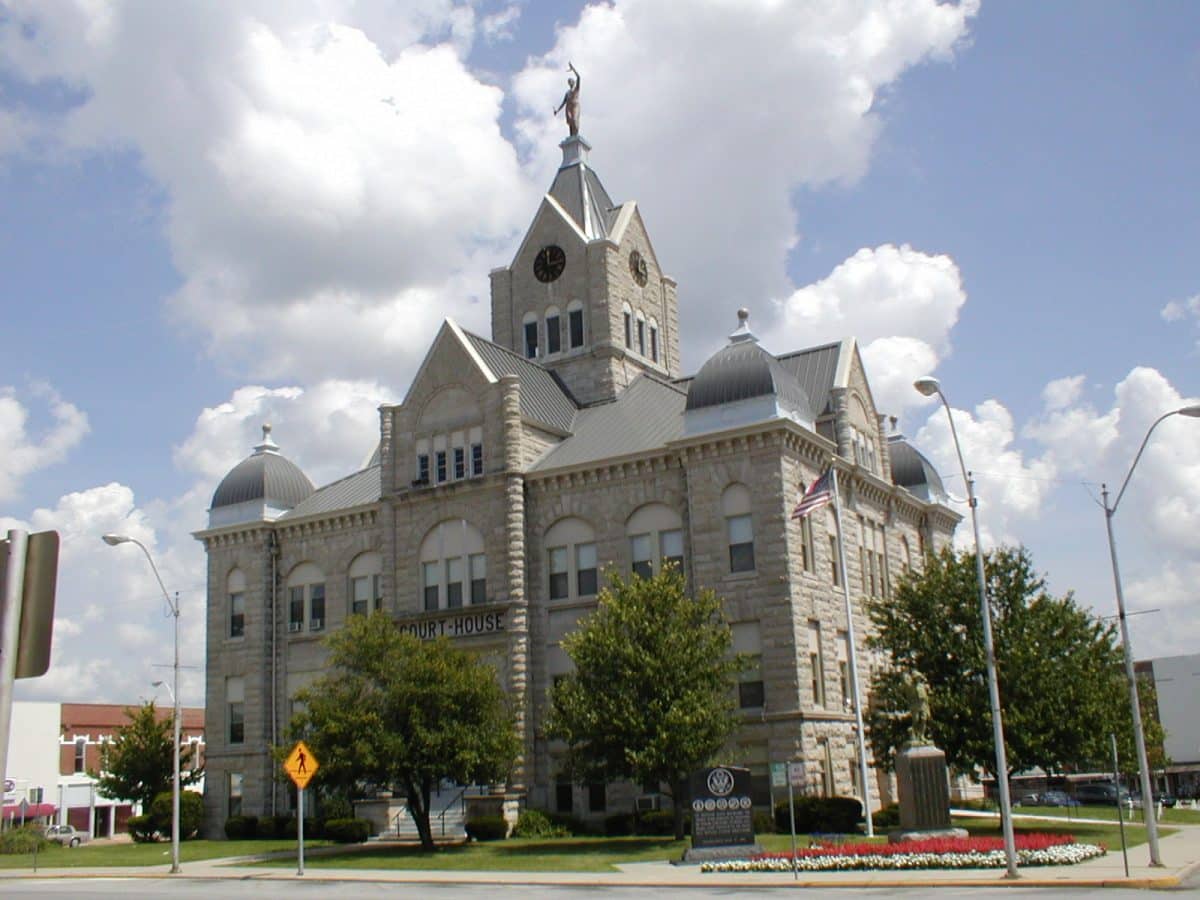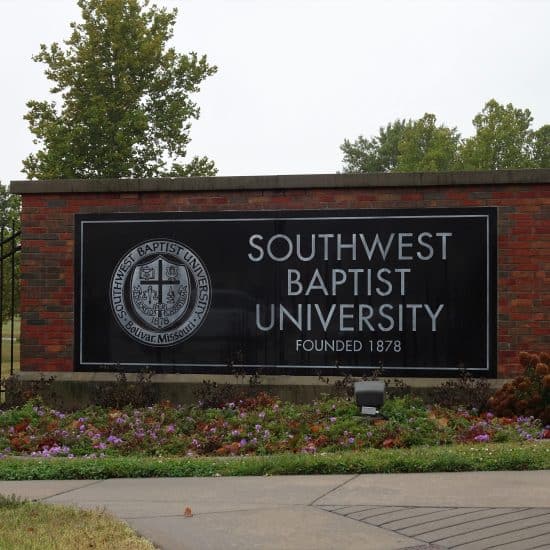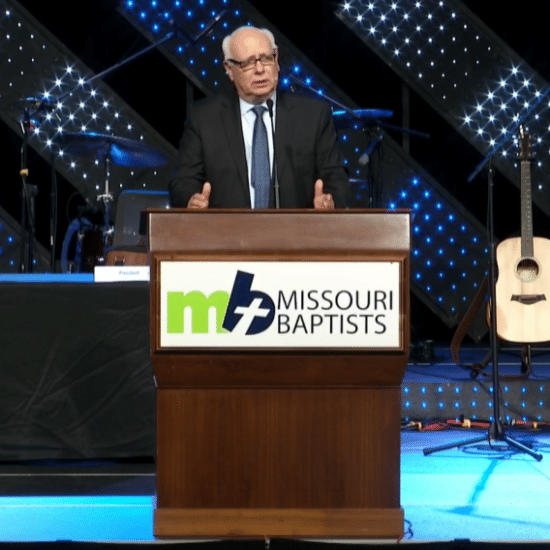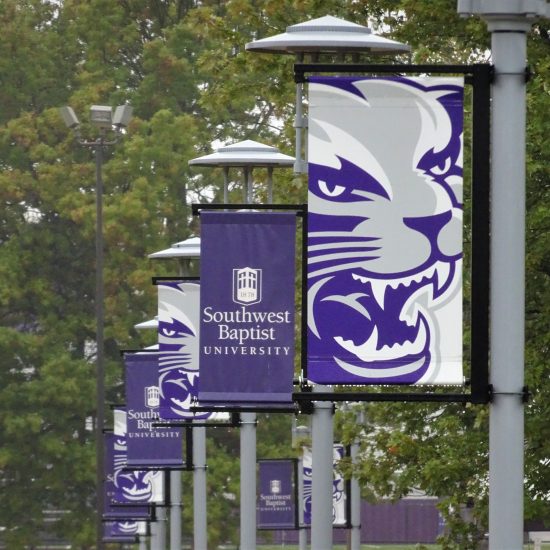
New legal filings by individuals seeking to block new governing documents for Southwest Baptist University respond to the arguments made by the school in Bolivar, Missouri. The new responses rebuke SBU’s attempt to reframe the legal dispute as an internal theological controversy.

Polk County Courthouse in Bolivar, Missouri. (William B. Roller/Creative Commons)
Donald Jump, a Baptist layman in Bolivar, filed a petition with the Circuit Court of Polk County on Feb. 22 to block the new governing documents. A current SBU professor and a current SBU student jointly filed a similar motion on March 5. SBU responded by claiming the disagreement was an ecclesiastical dispute, which would mean the court shouldn’t engage in it. All three individuals rejected SBU’s assertion.
Amid a more than two-year controversy as some Missouri Baptist Convention leaders sought to exert greater control over SBU, the SBU trustees appointed by the MBC adopted new articles of agreement and bylaws that name the MBC as sole corporate member and declare SBU trustees have a fiduciary responsibility to the MBC.
The new filing on March 15 by John Doe the professor and Jane Doe the student (both using pseudonyms because of their current statuses at SBU) criticizes SBU as the school “purports to divine ‘the heart’ of the Does’ Motion” by calling it an “ecclesiastical” challenge. Such a move, the filing by the professor and student adds, is “SBU’s self-serving mischaracterization.”
“While perhaps telling of SBU’s or the MBC’s superior knowledge of some internal doctrinal dispute (or their guilty conscience) the Does’ Motion does, and is intended to do, no such thing,” the new filing adds. “The Does do not challenge any religious beliefs or doctrines, and resolution of their Objections does not require, or even invite, the Court to resolve any ‘underlying controversies over religious doctrine.’”
“The Does do not invoke church doctrine or polity,” the filing adds. “Instead, their challenge is based solely upon SBU’s inability to meet the requirements of Chapter 352 and the adverse consequences to the public usefulness of the SBU corporation by the proposed amendment.”
A new filing on March 16 by Jump also urges the court to reject the ecclesiastical defense given by SBU since Jump’s challenge comes “not on religious grounds, but because the school’s trustees have surrendered the independence and control of the institution.”
“To escape close scrutiny of its amended corporate governance documents,” the filing reads, “SBU tries to dress the MBC up in cassocks so it can hide behind its skirts. But nothing can transform the issue before this Court into an ecclesiastical one.”
“The MBC does not own SBU; the school has not appeared as a subsidiary on the MBC’s financial statements,” the filing adds. “In fact, Missouri Baptists are decidedly not hierarchical. Indeed, the Missouri Baptist Convention itself is a group of cooperating autonomous religious bodies. There is no Baptist pope, nor cardinals, nor bishops. And no one ‘mother church’ that owns Baptist institutions.”
Other Legal Issues
Beyond dismissing SBU’s claim of a religious exemption to legal scrutiny of its legal documents, the three individuals seeking to intervene also addressed other legal claims made by the school.
The filing by the professor and student again asserts that the new governing documents violate Missouri statute about Chapter 352 nonprofit corporations. And the filing notes that SBU’s response on this issue instead cites provisions governing different types of nonprofits (Chapter 355).
The filing by the student and professor also says the legal change in the new governing documents to shift legal control to the MBC “should give the Court pause.” Previously, the filing notes, the Missouri Supreme Court ruled SBU was governed by an independent board and not controlled by another group like the MBC. The new governing documents would change that relationship.
“This change could trigger an exemption from statutes intended to protect the faculty (including John Doe) from discrimination and retaliation by SBU,” the filing notes. “And the change could jeopardize SBU’s receipt of public monies, given that the Missouri Constitution prohibits the use of State funds ‘to support or sustain any private or public … college, university, or other institution of learning controlled by any religious creed, church, or sectarian denomination whatever.’”
The filing also expresses concern that the new governing documents would enable the MBC to “convert SBU to a ‘controlled entity’” under IRS rules that would then treat SBU as essentially a subsidiary of the MBC.
“What effect this would have on either SBU or the MBC, and whether the MBC would stand to improperly benefit financially, should be a matter of investigation,” the filing adds.
Such questions, the filing from the professor and student asserts, means the court should appoint someone to intervene — even if the court doesn’t grant standing to the student or professor. As their filing notes four times (three times in bold), the court can appoint an attorney to investigate the documents if there is “any doubt” about the lawfulness or public usefulness of the corporation or its governing documents.
In the new filing by Jump, a similar point is made.
“Regardless of how this Court rules on Dr. Jump’s motion to intervene, it simply must allow someone to get to the bottom of whether these proposed changes in corporate governance are lawful and serve the ‘public usefulness’ of Southwest Baptist University,” the filing reads.
“This is necessary because one-sided proceedings make it difficult to get at the truth of a matter,” it adds. “It is abundantly clear that the ‘any doubt’ standard has been more than met here.”
As evidence of the problem in the court merely accepting SBU’s assertions, the filing from Jump mentions problems with documents SBU provided to the court.
The initial filing by the school of its new governing documents — before anyone filed an intervention petition — only included the articles of agreement but not the bylaws, even though the two are included on SBU’s website as one “consecutively-page-numbered” document. (And they are on SBU’s website as the governing documents even though, because of Jump’s petition, they are not yet actually governing.) The new bylaws were introduced to the court by Jump.
Additionally, Jump’s new filing also highlights that SBU gave the court its 1921 governing documents as an exhibit with its initial filing of the new articles of agreement. However, that version is not the current version governing the school. Rather the school approved new governing documents in 1975. That version was first introduced to the court along with the petition by the professor and student.
Jump’s filing also highlights the problem of SBU’s trustees voting for the new governing documents even though the current governing documents required they uphold their fiduciary responsibility to the school.
“One cannot read these documents without thinking: ‘How can a trustee with fiduciary duties that run exclusively to SBU ever vote for such a one-sided capitulation that comes with no legal consideration whatsoever?’” the filing asserts. “Prima facie, something smells.”






